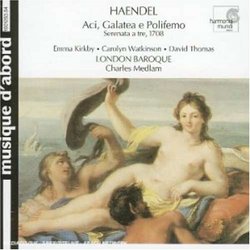| All Artists: George Frideric Handel, Charles Medlam, Emma Kirkby, Carolyn Watkinson, London Baroque, David Thomas, Michel Piguet, John Toll Title: Handel - Aci, Galatea e Polifemo / Kirkby · Watkinson · D. Thomas · London Baroque · Medlam Members Wishing: 0 Total Copies: 0 Label: Harmonia Mundi Fr. Original Release Date: 1/1/1998 Re-Release Date: 3/10/1998 Album Type: Import Genres: Special Interest, Soundtracks, Classical Styles: Opera & Classical Vocal, Chamber Music, Historical Periods, Baroque (c.1600-1750), Classical (c.1770-1830), Instruments, Reeds & Winds, Strings Number of Discs: 2 SwapaCD Credits: 2 UPC: 794881421121 |
Search - George Frideric Handel, Charles Medlam, Emma Kirkby :: Handel - Aci, Galatea e Polifemo / Kirkby · Watkinson · D. Thomas · London Baroque · Medlam
 | George Frideric Handel, Charles Medlam, Emma Kirkby Handel - Aci, Galatea e Polifemo / Kirkby · Watkinson · D. Thomas · London Baroque · Medlam Genres: Special Interest, Soundtracks, Classical
|
Larger Image |
CD Details |
CD ReviewsReissue of 1987 recording Terry Serres | 06/30/1999 (3 out of 5 stars) "This set got mixed reviews when it came out in 1987 but I can't see why. I can't think of a better cast list than Emma Kirkby as the shepherd Acis, Carolyn Watkinson as the nymph, and David Thomas as the bad guy cyclops. This 1708 Italian serenata has been overshadowed by the 1716 English masque Acis and Galatea but in fact there is only one aria shared between the two - they are two separate works with different atmospheres. From memory some more material from the 1708 version was added to the London revival of Acis, and this version was later picked up for Mozart's German realisation (as recorded by Pinnock for Archiv in the 1980s). Full texts and translations. Timing 106'10".PS: Anyone looking for the English version on Amazon would be well advised to give the Scholars Acis and Galatea on Naxos a try. A lively period instrument performance. 80' timing and full texts." Delectable Early Handel - A Must for Kirkby Fans ... Choose Terry Serres | Minneapolis, MN United States | 07/29/2002 (5 out of 5 stars) "This is not the English masque _Acis and Galathea_ but an earlier effort on the same story composed during the composer's youthful tour of Italy, described as a "serenade for three voices." It is deliciously scored, a perfect gem. All the parts work well--duets, ensembles, solos, and recitatives. It doesn't hold the stature of his later oratorio and operatic output, but it deserves equal renown for its pleasures are indisputable. With such refined yet expressive singing, you won't be disappointed to hear, in earlier guises, passages more familiar from Rinaldo and elsewhere.
Curiously, the higher of the women's parts is the "trousers" role here, and this is one of my all-time favorite performances from Emma Kirkby. More curiously still, Watkinson sometimes sounds countertenorish in the female role of Galatea. David Thomas tackles the role of the monstrous Polfemo and is utterly secure with all the fiendish coloratura and rock-bottom low notes! (There is some added resonance, but it doesn't detract and it doesn't blur his technique in the least.) The opening duet between Aci and Galatea, "Sorge il Di," is one of those impossibly delectable blending of women's voices that just lather you up in a bath of sensuous sound. There is a solo ("Que l'augel") where Kirkby's voice and oboe echo each other so perfectly that you can't tell where one begins and the other leaves off. Watkinson's solo at the end of disk 1, "Se m'ami, o caro," is plangent with heartache. The piece continues onto the second disk with Kirkby delivering one of my favorite of all death scenes on track 3, with her da capo restatement so subtly embellished, and such telling vibrato on the word "palpita" ("beats" [my heart]) that, if you're as raptly attentive as I was, it takes your breath away. The Polifemo parts could easily sound uniformly blustery, but David Thomas actually manages to give the character emotional and vocal shading! The "serenade" concludes with something of a "curtain call" number where the three soloists (including the lamented Aci) reprise the moral of the story jubilantly! In the economy of scale, melodic invention, deployment of voices, and unusual place in the composers' output, it is somewhat reminiscent of Bach's Coffee Cantata. The sound is perfectly judged and the instrumentalists flawlessly characterful and supportive. The second disk is rounded out with three recorder (flute à bec) sonatas that are delivered with sinuous elegance and infectious panache. This recording is far more elegant and cohesive than the more recent and much-lauded Emmanuelle Haïm recording. Haïm has interesting things to say and elicits exciting sounds from her instrumentalists, but I have yet to hear a recording of hers that makes a convincing case for her vocal choices. This recording is much better, and one should not be swayed by the more recent vintage of the Haïm." |

 Track Listings (14) - Disc #1
Track Listings (14) - Disc #1